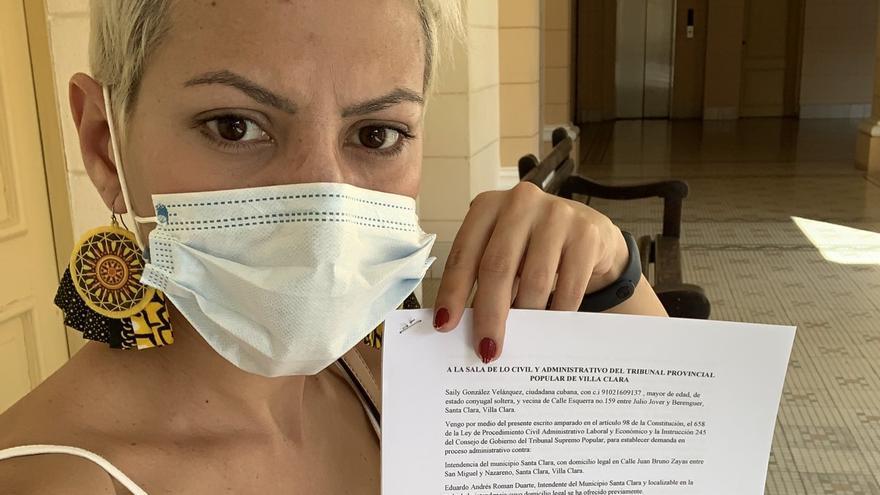
![]() 14ymedio, Havana, October 29, 2021 — The activist and businesswoman Saily Gonzalez has filed a lawsuit in Santa Clara for moral damage to dignity and honor. The suit is filed on her behalf and on behalf of the signatories to the March for Civic Change. Miryorly Garcia filed a similar lawsuit in Havana and expectations are similar suits will be filed in other cities such as Cienfuegos shortly.
14ymedio, Havana, October 29, 2021 — The activist and businesswoman Saily Gonzalez has filed a lawsuit in Santa Clara for moral damage to dignity and honor. The suit is filed on her behalf and on behalf of the signatories to the March for Civic Change. Miryorly Garcia filed a similar lawsuit in Havana and expectations are similar suits will be filed in other cities such as Cienfuegos shortly.
The signatories are members of Archipiélago, a group which has called for protest marches throughout Cuba on November 15. The suit is in response to a ruling by the Office of the Attorney General declaring the march to be illegal. In an interview with 14ymedio, Gonzalez said the government statement was the precursor to a string of accusations against her group which were later made in the official press and on the TV news program Mesa Redonda (Roundtable).
“If we challenge this statement, if we oppose it, more people will realize that the truth is on our side,” she says.
Filing a lawsuit for Gonzalez is an exercise in civic engagement. “We have been defamed by a few people acting as individuals but who are figures of power.” She describes that power as dictatorial, defending itself by attacking her group with lies.
“One of the fundamental problems here in Cuba is that historically citizens have not been aware of their rights or of the tools they have to exercise them,” Gonzalez adds. “And that’s one of the things has been most attractive to me about Archiépelago from the beginning: responding to authoritarianism with civic action. [This is] one more example of civic action, of recognizing our rights, even if the dictatorship refuses to recognize them.”
In the documents filed in Santa Clara and Havana the activists remind the courts that when Archipiélago filed permit applications to hold the march, the official response was that it was illicit because the stated reasons for such a march were not valid. However, the activists argue, “[The response] offers no legal explanation as to why non-violent public expressions in support of the rights of all Cubans, of the release of political prisoners, and of a peaceful, democratic solution to the ever more obvious differences within society would be illicit.”
The lawsuits challenge three specific points made by officials: that the march’s promoters are trying to effect regime change; that the march is part of a broader strategy of regime change in Cuba directed from other countries; and that some promoters of the march have links to subversive organizations or to agencies financed by the U.S. government. None of these claims, the plaintiffs say, are backed up by evidence. “The statements by officials are based on politically influenced personal opinion which reveal bias and amount to unfounded characterizations of the signatories,” the documents say.
Not a day goes by without the government trying in some way to discredit the planned march. In Thursday’s closing speech during the current session of the National Assembly, President Miguel Diaz-Canel barely touched upon the serious problems plaguing the country — the energy crisis, currency unification, the Covid pandemic, falling GDP and hyperinflation — to instead emphasize that “no one is going to spoil the party.” It was a reference to another event scheduled on November 15: the lifting of Covid restriction and a total reopening of the country, including to tourism.
____________
COLLABORATE WITH OUR WORK: The 14ymedio team is committed to practicing serious journalism that reflects Cuba’s reality in all its depth. Thank you for joining us on this long journey. We invite you to continue supporting us by becoming a member of 14ymedio now. Together we can continue transforming journalism in Cuba.
